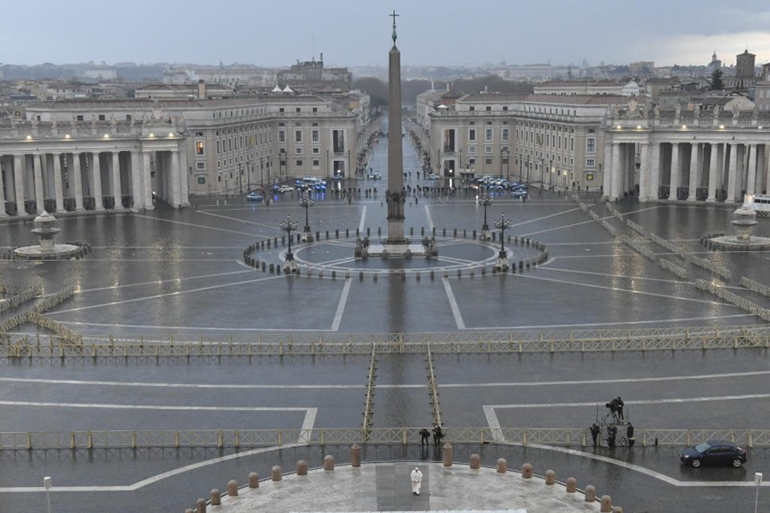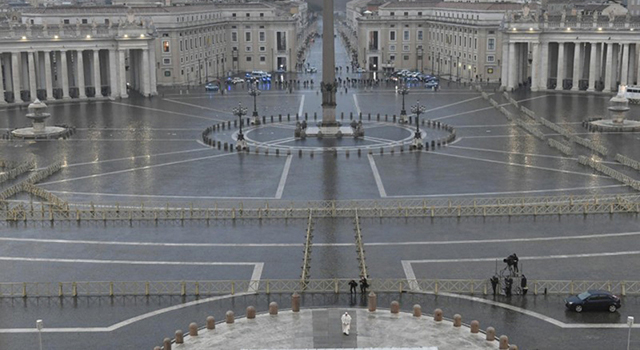By Jose Antonio Varela Vidal -

Photographer: Vatican News
Pope Francis walks in the rain in an empty plaza outside St. Peter's Basilica March 27, 2020, before giving an Urbi et Orbi blessing and leading a prayer service for the end of the coronavirus pandemic.
During the plagues in Italy in the 16th and 17th centuries, the popes and archbishops of the time, such as St. Charles Borromeo in Milan, decreed the total closure of the churches and the suspension of processions. However, priests were instructed to celebrate Masses in strategic places, so that the faithful could participate from their windows.
Nearly 500 years have passed, and humanity is facing a new epidemic, in this case the coronavirus which causes COVID-19. Although the scenario is different, now the windows in many countries are used to applaud and sing for health professionals, safety experts and custodians, to encourage and thank them for staying at work.
These public praises, however, do not encompass everyone. A silent group counts on the gratitude and applause of the population of Latin America, who elevate prayers interceding for them from balconies and hearts. We are talking about the priests and other pastoral ministers who have literally put themselves "on the front lines," since the concern and zeal of the Church is not in quarantine.
That is why, during the Angelus in mid-March, Pope Francis greeted and congratulated the priests of those countries affected by the pandemic for the "creativity" they are developing to be close to their people, so that the faithful "do not feel abandoned.”
ISOLATED BUT CREATIVE
During a conversation with a Peruvian priest, I understood the pope's words in their total dimension. My call was intended to congratulate him for his "debut" on the social networks. Hours earlier, he had celebrated the Eucharist live through the parish Facebook page, which he had commissioned to communicate relevant information although he did not personally administer it.
With excitement, the parish priest – who works 570 kilometers from Lima in the middle of the Andean mountains – told me, "They have sent us messages from various communities and even from abroad." I noticed how, just like St. Paul, scales were falling from his eyes and his vision was widening. He was undergoing that "pastoral conversion" which has been so called for in these times, both in the synods and in the documents of the Church.
This so-called kairos moment has enabled Latin American pastors to discover or reevaluate the great potential of social networks and the internet. Many have understood that, as a network of networks, this technology contains in one place those audios and videos, text messages and photographs "that human ingenuity, with God's help, has extracted from created things...", as announced by the innovative Inter Mirifica decree of Vatican II in 1963, dedicated to the media of social communications.
TOGETHER AS BROTHERS AND SISTERS
Having said that, everything else is history and verification. It is a fact that in the local churches of all the countries in Latin America there is a "Tech Spring," a true revolution of communications that cannot be compared to anything in the past and will not be reversed. However, it will leave high expectations because it has created a new demand from the faithful in the face of a very high supply, fruit of the creativity and apostolic zeal of pastors and ecclesial ministers.
It is impressive to see the number of notifications received each day on social networks, inviting people to participate in a live Eucharist, a meditation, or to participate in all the rites of the Easter Triduum, as was the case during Holy Week on the continent.
We have become acquainted with the personal chapels of cardinals and bishops, the rooms of parish priests and even the inner gardens of convents; but what was most evident was that the Latin American Church is a community that celebrates and announces. And that, despite its difficulties, the Church has stood by the divine mandate that evangelization is imperative, together with the firm Pauline conviction that "the word of God is not bound."
NETWORKS OF COMMUNION
In his message for World Communications Day 2019, Pope Francis insisted that social networks should be seen as "an opportunity to promote encounter with others," so that if they are used "as an extension or expectation of such an encounter, then the network concept is not betrayed and remains a resource for communion."
This response has been clear these weeks — both past and upcoming — when communities and priests in Hispanic countries continue to turn to the networks to celebrate or to send meditations, responding to the concerns and fears of their followers, even in times of confinement. Likewise, lay initiatives of praying Lauds and Vespers through video conferences and even praying family rosaries via telephone from Miami to Patagonia have been validated.
To this, we must add the live broadcast of Eucharistic adoration vigils, whether inside the temples or even from their roofs, spiritual moments that have allowed thousands of people to recover the hope that the living Christ could come into their homes again.
This is a propitious opportunity for dioceses and parishes, apostolic movements, congregations and schools in Latin America to evaluate all the evidence and finally give the proper place and weight to the ministry of communications in the local church. Then, it would be possible to provide the human and material resources that such an apostolate demands.
Let the latter not be an option because, even if the world is immunized against the coronavirus, other epidemics are still out there, such as superficiality, pragmatism or fragmentarism. These will continue to challenge the Christian faith throughout the world.
Jose Antonio Varela Vidal is a Peruvian journalist and columnist for La Voz Católica in Miami.

